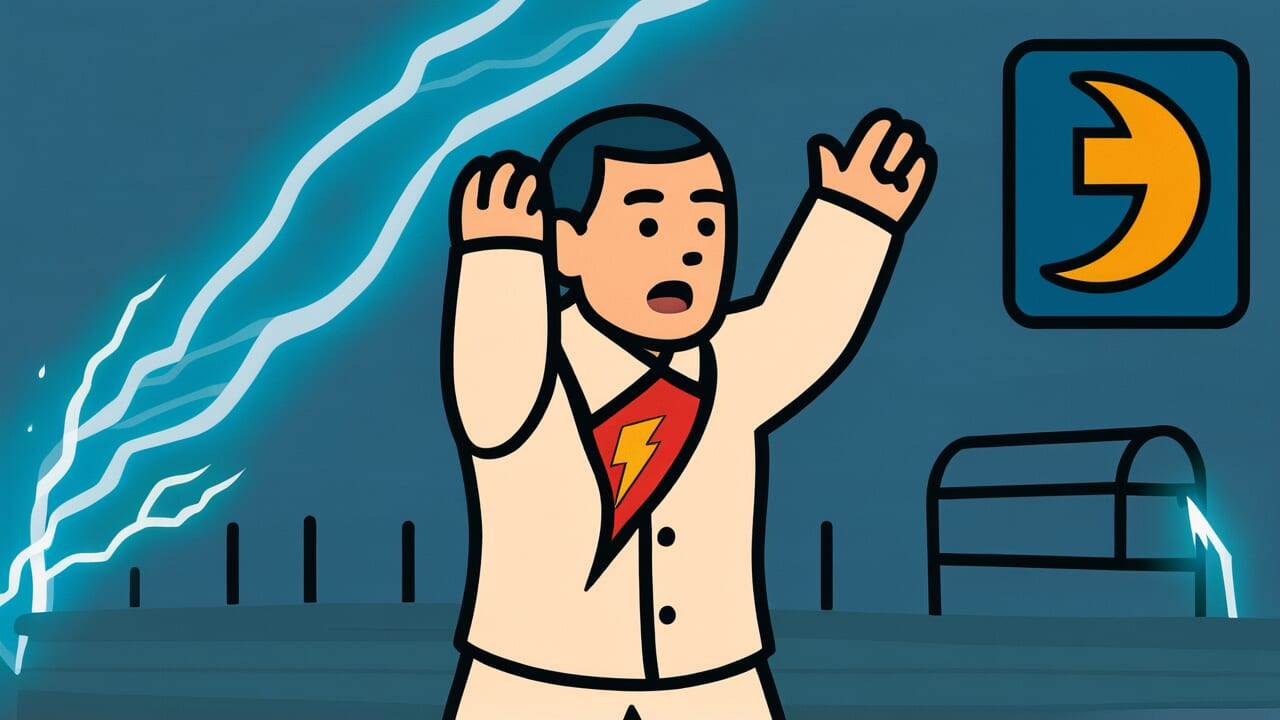How to Read “Don’t go next door during February and August thunder”
Nihachigatsu no kaminari ni tonari ni iku na
Meaning of “Don’t go next door during February and August thunder”
This proverb warns that thunder in February and August is especially dangerous. You should never approach places where lightning is striking.
Thunder during these seasonal transition months is different from regular summer thunder. It’s harder to predict, more sudden, and more intense.
This means you need to be extra careful during these times. The proverb teaches practical wisdom: when thunder strikes, don’t move toward it. Instead, stay in a safe place and wait for the storm to pass.
Even today, thunder during unstable weather periods is hard to predict. Sudden weather changes require careful attention.
This proverb reminds us not to underestimate natural dangers. We should act cautiously and thoughtfully.
The lesson still matters today, especially for outdoor activities. Pay close attention to weather changes during seasonal transitions.
Origin and Etymology
No clear written records explain the origin of this proverb. However, we can understand it through the phrase structure and Japan’s weather observation history.
The combination of February and August refers to seasonal transitions in the old lunar calendar. The second lunar month marked spring’s arrival. The eighth month marked the shift to autumn.
Both periods had unstable weather. Thunder during these times was different from summer thunder. It was unpredictable, sudden, and violent.
“Don’t go next door” is a direct warning. It means don’t approach places where thunder is striking.
People in old times understood lightning’s dangers through experience. They believed thunder during seasonal transitions required extra caution.
Before the Edo period, weather-related sayings were passed down orally. Farmers and fishermen shared this practical wisdom.
This proverb likely emerged the same way. It was passed down as a lesson to protect people’s lives.
Sharp observation of seasonal weather changes created this proverb. It reflects deep understanding of nature’s patterns.
Usage Examples
- Don’t go next door during February and August thunder, so let’s cancel today’s mountain climbing
- Thunder clouds are approaching in early spring. Don’t go next door during February and August thunder, they say, so let’s head home early
Universal Wisdom
This proverb has been passed down because it contains deep truth. It teaches humility toward nature’s power and the importance of learning from experience.
Humans react quickly to visible dangers. But we often forget that peaceful nature can suddenly turn violent.
Seasonal transitions seem ordinary. Yet unpredictable dangers hide during these times. This insight shows our ancestors’ sharp observation skills.
The proverb teaches more than just caution about thunder. It offers wisdom for all situations: “When things are different, you need extra care.”
During times of change, transition, or boundaries, people become careless. Yet these are often the most dangerous moments.
Our ancestors feared nature’s threats. But they also observed nature, found patterns, and passed wisdom to the next generation.
This effort is humanity’s fundamental strength for survival. They didn’t try to control nature. They chose to understand it and coexist with it.
This humility is the universal wisdom contained in this proverb.
When AI Hears This
Out-of-season thunder has statistically low occurrence rates. For example, February and August thunder happens less than one-tenth as often as midsummer thunder.
But the human brain makes a mistake. It thinks “rare phenomenon = low danger.” This is the normalcy bias trap.
In reality, danger per lightning strike is the same regardless of season. Out-of-season thunder actually indicates unstable atmospheric conditions. Weather data shows it creates unpredictable lightning patterns.
The phrase “don’t go next door” shows interesting awareness of distance. Electric current from lightning spreads through the ground for several meters.
Even if you avoid direct strike, you can get electrocuted within a few meters. Side flash and step voltage can kill you.
But humans think “I wasn’t directly hit, so I’m safe.” This is the risk dilution effect. People mistakenly relax when danger seems spatially distributed.
Behavioral economist Kahneman’s research shows people tend to perceive low-probability dangers as “zero.”
This proverb accurately captures probability theory. Rare phenomena create complacency. Small distances become life-or-death boundaries.
It’s remarkable that people hundreds of years ago understood risk perception blind spots. They grasped through experience what modern science has proven.
Lessons for Today
This proverb teaches us the importance of caution during times of change.
Our daily lives contain many “transition periods” like seasonal changes. When we move to new environments, when work projects shift, when relationships change.
These periods of change may seem calm on the surface. But unpredictable difficulties often hide beneath.
The key is to be “more careful than usual” during times of change. What you could do unconsciously in familiar situations might not work in new ones.
Rather than rushing forward, have the courage to stop and assess the situation. This ultimately leads to a safer and more certain path.
This proverb also teaches humility toward nature and changing situations. Optimistic thinking like “it’ll be fine” can sometimes bring big risks.
Don’t dismiss warning signs. Act cautiously. This attitude is precious wisdom that protects your life.



Comments